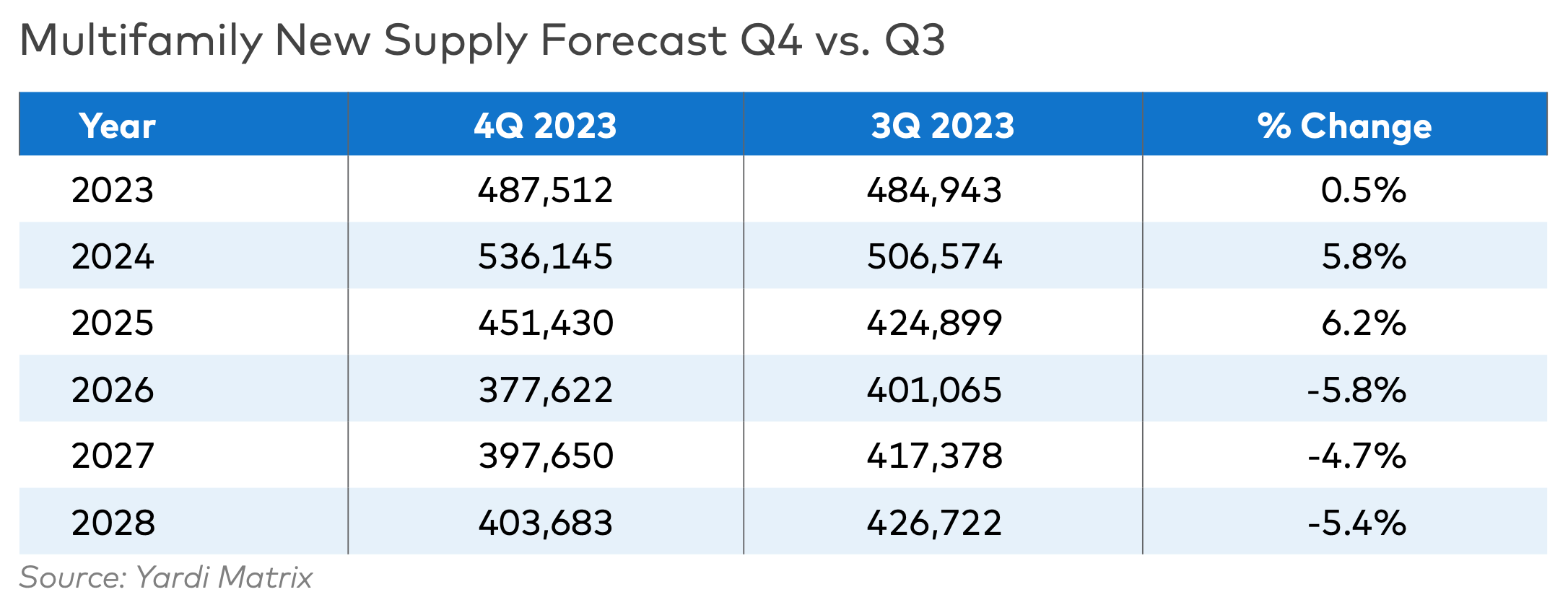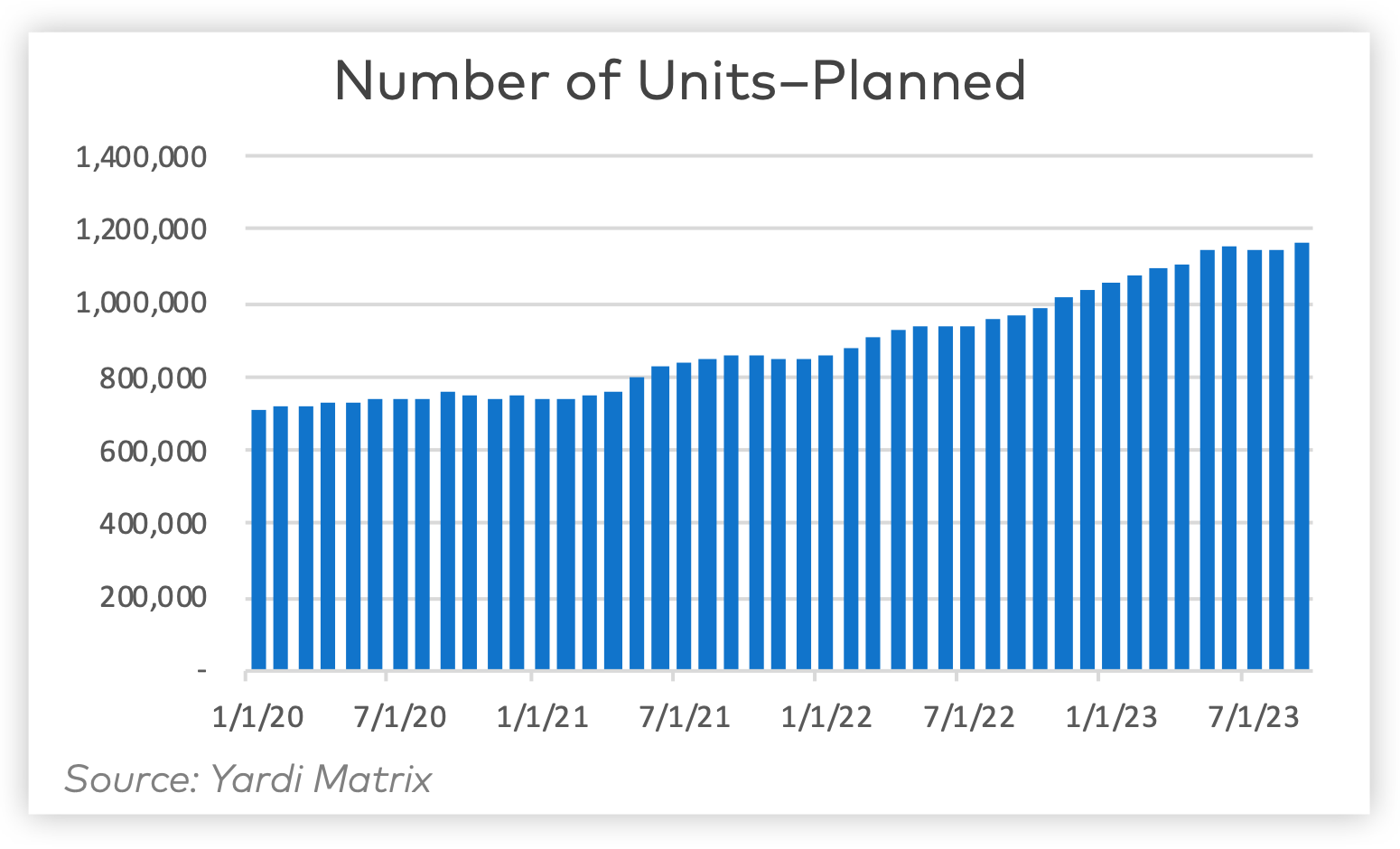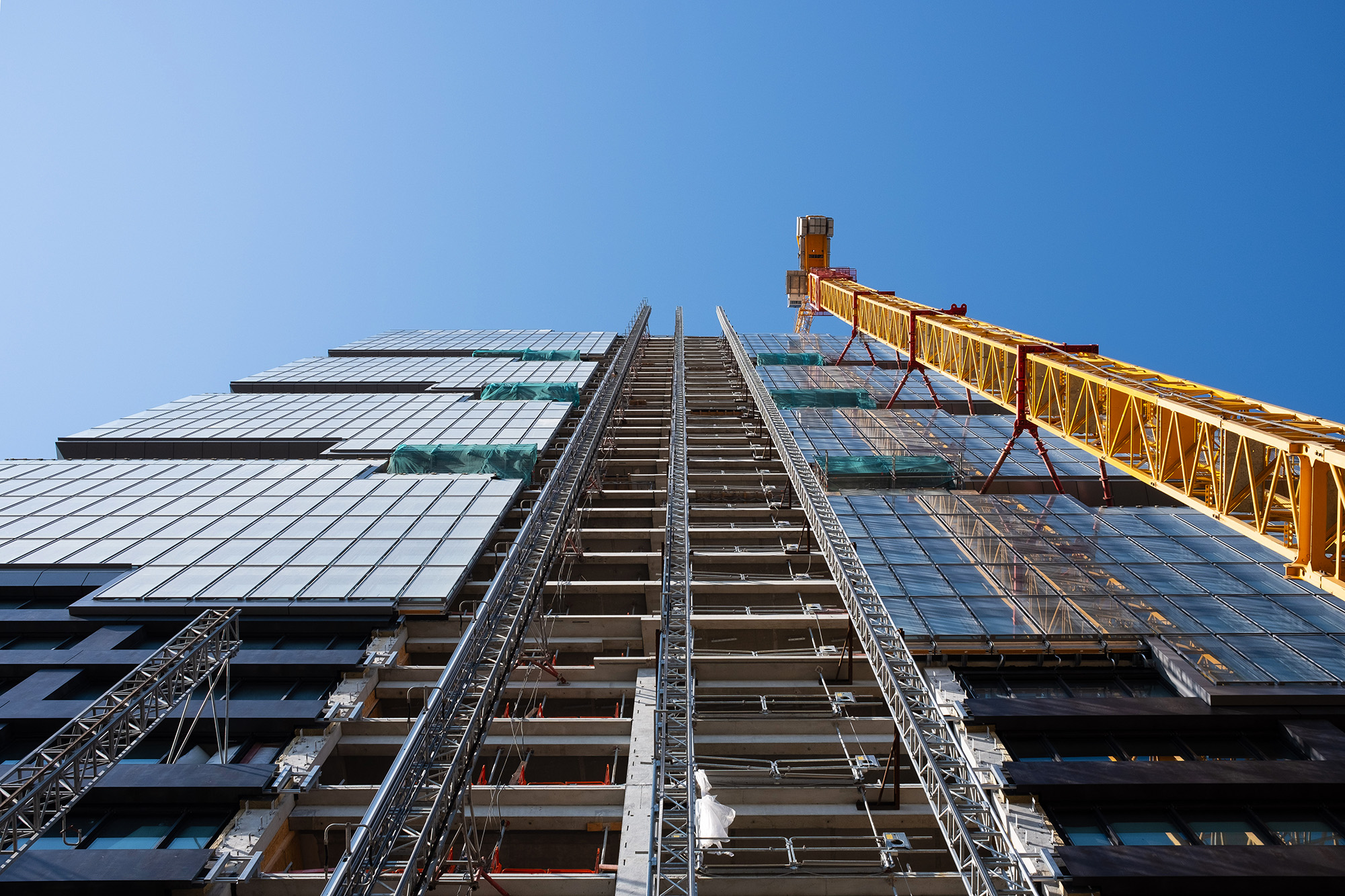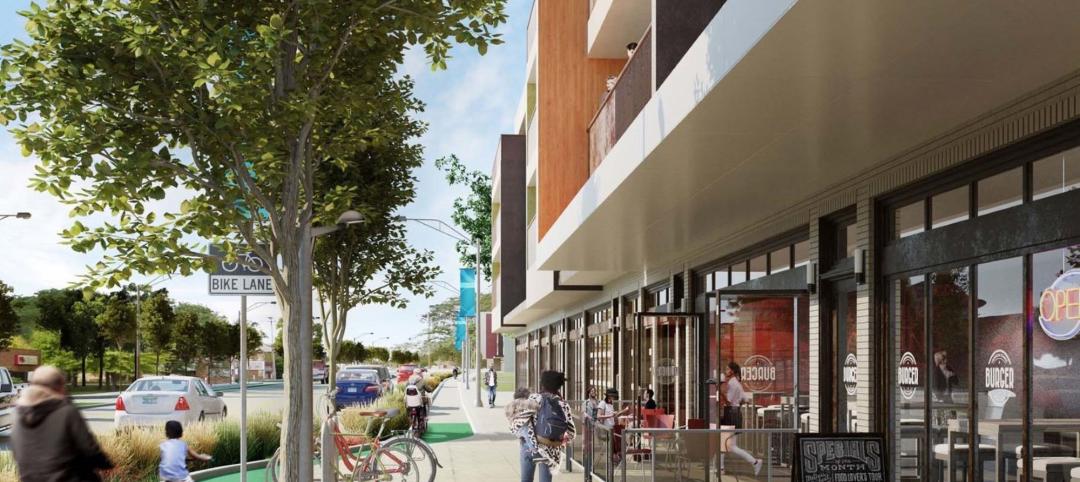Yardi Matrix has released its Q4 2023 Multifamily Supply Forecast, emphasizing a short-term spike and plateau of new construction. According to the report, Yardi finds that construction starts have remained "relatively robust" in the first half of 2023, with the under-construction pipeline increasing by 7.6% in Q3.
Because of this, new activity is starting to slow. The forecast for project completions has increased by 5.8% for 2024 and 6.2% for 2025. Completions for later years are forecasted to decrease by roughly 5 percent, according to Yardi.
Long-Term Multifamily Supply Forecast
"We continue to expect a mild recession will start in late 2023 or early 2024," the report states. Yardi's forecast for 2026 has therefore been reduced by 5.8% to 377,622 units, while the baseline forecast for 2027 and 2028 completions has been similarly reduced by 4.7% and 5.4% respectively.

For the multifamily markets monitored by Yardi Matrix, there are currently 1.2 million units within the under-construction pipeline. Of these units, just under 480,000 are in the lease-up phase, which is in line with the trailing six-month average of 483,000 units but represents a substantial 15.9% increase from the figures of the previous year. Most of these units are expected to be finalized either by the end of 2023 or during the first half of 2024.
What does this mean for 2024?
Though short-term construction starts remained elevated through the first half of 2023, several findings from the third quarter suggest that new development activity is slowing. The near flat growth recorded in Q3 is a sharp departure from the growth the planned pipeline recorded post pandemic—another sign that development interest is slowing, according to Yardi.
Overall, Yardi Matrix anticipates an uptick in construction completions in the next two years. Yardi's construction start data reached its year-over-year peak in May 2023. Both planned and prospective pipelines plateaued in Q3.
"Our baseline forecast envisions new supply bottoming in 2026 at around 377,000 units, while the alternative downside forecast models new supply bottoming in 2026 at 335,000 units," writes Ben Bruckner, Senior Research Analyst, Yardi Matrix.

Review the latest Multifamily Supply Forecast here.
Yardi Matrix offers the industry’s most comprehensive market intelligence tool for investment professionals, equity investors, lenders and property managers who underwrite and manage investments in commercial real estate. Yardi Matrix covers multifamily, student housing, industrial, office and self storage property types. Email matrix@yardi.com, call 480-663-1149 or visit yardimatrix.com to learn more.
Related Stories
MFPRO+ New Projects | Oct 30, 2024
BIG’s One High Line finally reaches completion in New York City’s West Chelsea neighborhood
One High Line, a luxury residential project spanning a full city block in New York’s West Chelsea neighborhood, reached completion this summer following years of delays related to investor lawsuits.
MFPRO+ New Projects | Oct 30, 2024
Luxury waterfront tower in Brooklyn features East River and Manhattan skyline views
Leasing recently began for The Dupont, a 41-story luxury rental property along the Brooklyn, N.Y., waterfront. Located within the 22-acre Greenpoint Landing, where it overlooks the newly constructed Newtown Barge Park, the high-rise features East River and Manhattan skyline views along with 20,000 sf of indoor and outdoor communal space.
Multifamily Housing | Oct 28, 2024
A case for mid-rise: How multifamily housing can reshape our cities
Often referred to as “five-over-ones,” the mid-rise apartment type is typically comprised of five stories of apartments on top of a concrete “podium” of ground-floor retail. The main criticism of the “five-over-one” is that they are often too predictable.
Adaptive Reuse | Oct 22, 2024
Adaptive reuse project transforms 1840s-era mill building into rental housing
A recently opened multifamily property in Lawrence, Mass., is an adaptive reuse of an 1840s-era mill building. Stone Mill Lofts is one of the first all-electric mixed-income multifamily properties in Massachusetts. The all-electric building meets ambitious modern energy codes and stringent National Park Service historic preservation guidelines.
MFPRO+ News | Oct 22, 2024
Project financing tempers robust demand for multifamily housing
AEC Giants with multifamily practices report that the sector has been struggling over the past year, despite the high demand for housing, especially affordable products.
Products and Materials | Oct 17, 2024
5 multifamily tech products for your next project
Multifamily housing and technological upgrades go hand-in-hand. From the rise in electric vehicle charging needs to the sophistication of smart home accessories, tech products are abound in the multifamily space.
Codes and Standards | Oct 16, 2024
North Carolina’s code policies likely worsened damage caused by Hurricane Helene
The North Carolina Legislature’s rejection of building code updates likely worsened the damage caused by Hurricane Helene, code experts say. Over the past 15 years, lawmakers rejected limits on construction on steep slopes, which might have reduced the number of homes destroyed by landslides.
MFPRO+ News | Oct 16, 2024
One-third of young adults say hurricanes like Helene and Milton will impact where they choose to live
Nearly one-third of U.S. residents between 18 and 34 years old say they are reconsidering where they want to move after seeing the damage wrought by Hurricane Helene, according to a Redfin report. About 15% of those over age 35 echoed their younger cohort’s sentiment.
Student Housing | Oct 9, 2024
University of Maryland begins work on $148 million graduate student housing development
The University of Maryland, in partnership with Campus Apartments and Mosaic Development Partners, has broken ground on a $148.75 million graduate student housing project on the university’s flagship College Park campus. The project will add 741 beds in 465 fully furnished apartments.
MFPRO+ News | Oct 9, 2024
San Francisco unveils guidelines to streamline office-to-residential conversions
The San Francisco Department of Building Inspection announced a series of new building code guidelines clarifying adaptive reuse code provisions and exceptions for converting office-to-residential buildings. Developed in response to the Commercial to Residential Adaptive Reuse program established in July 2023, the guidelines aim to increase the viability of converting underutilized office buildings into housing by reducing regulatory barriers in specific zoning districts downtown.


















